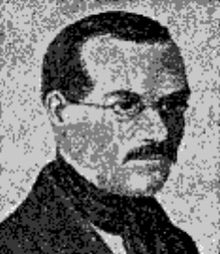Jacob Niclas Ahlström

Jacob Niclas Ahlström (5 June 1805 in Visby, Gotland – 14 May 1857 in Stockholm) was a Swedish Kapellmeister and composer.
Beginning his studies at Uppsala University in 1824, Ahlström dropped out due to lack of money and joined a touring theatrical troupe. From 1832 to 1842, he served as a cathedral organist and music teacher in Västerås and then became a Court Kapellmeister and organist in Stockholm until his death. In 1845, he held a concert in Berlin, during which he played Swedish folk songs and dances.
Ahlström composed two operas based on libretti by Frans Hedberg, incidental music (for plays such as Agne, Positivhalaren, Ringaren i Notre Dame, and Hinko och Urdur), a vocal symphony, chamber music, and lieder. Together with Per Conrad Boman, he published Svenska folksånger, folkdanser och folklekar, the best-known collection of Swedish folk songs which appeared during the 19th century. In 1852, he also published the Musikalisk fickordbok (Musical Pocket Book), which enjoyed several reissues.
References
- Ahlström, Jacob Niklas from Nordisk familjebok (in Swedish).
- 1805 births
- 1857 deaths
- 19th-century classical composers
- 19th-century Swedish people
- Swedish opera composers
- Male opera composers
- People from Gotland
- Romantic composers
- Swedish classical composers
- Swedish male classical composers
- Swedish classical organists
- Male organists
- Swedish conductors (music)
- Male conductors (music)
- 19th-century conductors (music)
- 19th-century male musicians
- Swedish composer stubs
- Organist stubs
- Swedish musician stubs
- Opera biography stubs
